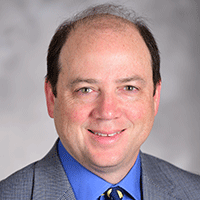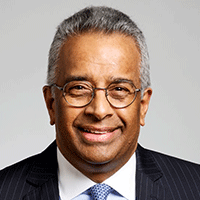Monday, October 30 – 8:00am – 9:15am
Convention Center, La Nouvelle C
(Continental Breakfast Served 7:30am – 8:00am)

E. Glenn Lightsey, Ph.D.
David Lewis Professor of Space Systems Technology
Georgia Institute of Technology
Keynote Title: Small Satellites and the Future of Planetary Space Exploration
Abstract: Small satellites are redefining the way new technology is developed and infused into space missions. This talk will begin by describing the Lunar Flashlight mission-an advanced technology mission using a small satellite to look for ice at the Moon's South Pole. Lunar Flashlight is a NASA mission with university participation that was launched on a commercial rocket in 2022. Lunar Flashlight is an example of changes that are occurring in space technology across the space industry. We then discuss how these changes are influencing interplanetary space exploration to the Moon and Mars, and what could happen with planetary space exploration in the next 25 years.
Biography: Dr. Glenn Lightsey is the David Lewis Professor of Space Systems Technology in the School of Aerospace Engineering at Georgia Tech. He is the Director of the Center for Space Technology and Research, an interdisciplinary research center that facilitates space research at Georgia Tech. He is the Co-Principal Investigator for the Lunar Flashlight mission at Georgia Tech, which designed the propulsion system and conducts mission operations. Dr. Lightsey founded two companies that create space technology, and he has co-authored more than 160 technical publications. He is a member of the National Academy's Space Technology Industry, Government, and University Roundtable. Dr. Lightsey has received the AIAA's Mechanics and Control of Flight Award and the Institute of Navigation's Tycho Brahe Award.
Tuesday, October 31, 8:00 – 9:00am
Convention Center, La Nouvelle C
(Continental Breakfast Served 7:30-8:00am)

Keynote Lecture-ASME Robert Henry Thurston Lecture Award
Ramamoorthy Ramesh, Ph.D.
Vice President for Research
Rice University
Keynote Title: Energy: The True Final Frontier
Abstract: More than five decades ago, President Kennedy exhorted the nation to rise up and meet the biggest challenges of that period, amongst them being the Race to the Moon, that led to the establishment of NASA and the Apollo program. In one of the most stirring presidential speeches, he urged the nation to "ask not what the country can do for you, but what you can do for the country". It is quite likely that we, as a nation (and the world), are once again at crossroads, from many perspectives. I will use Energy as a "Clear and Present" example of where we, as scientists, engineers, young and not-so-young, need to rise up and meet the challenges that we are faced with. Energy and Water are perhaps the most pressing issues of our generation. I will argue that Materials are the most strategic enablers of both fields. A few years ago, I had the opportunity to serve the nation in the role of the founding Director of the DOE Sunshot Initiative, which was designed to bring solar electricity down to grid parity. The huge impact of Sunshot and more generally Solar, is already being felt with prices of solar electricity dropping rapidly. More recently, I had the opportunity to help shape the "Earthshots", aimed at solving the biggest problems in Energy and Climate Change. In this talk, I will attempt to take you through from the "Macro", global energy economics down to what fundamental materials physics can do to help solve the key problems in Energy Efficient Electronics.
Biography: Ramesh pursues key materials physics and technological problems in complex multifunctional oxides. Using conducting oxides, he solved the 30-year enigma of polarization fatigue in ferroelectrics. He pioneered research into manganites coining the term, Colossal Magnetoresistive (CMR) Oxides. His work on multiferroics demonstrated electric field control of ferromagnetism, a critical step towards ultralow power memory and logic elements.
His extensive publications (>650) on the synthesis and materials physics of complex oxides are highly cited (over 100,000 citations, H-factor over 150). He is a fellow of APS, AAAS & MRS and an elected member of the U.S. National Academy of Engineering, a Foreign member of the Royal Society of London, the Indian National Science Academy, the Indian National Academy of Engineering and a Fellow of the American Academy for Arts and Sciences. His awards include the Humboldt Senior Scientist Prize, the MRS Turnbull lectureship prize, the APS Adler Lectureship and McGroddy New Materials Prize, the TMS Bardeen Prize and the IUPAP Magnetism Prize and Neel Medal and the Europhysics Prize in 2022. He was recognized as a Thomson-Reuters Citation Laureate in Physics for his work on multiferroics.
He served as the Founding Director of the successful Department of Energy SunShot Initiative in the Obama administration, envisioning and coordinating the R&D funding of the U.S. Solar Program, spearheading the reduction in the cost of Solar Energy. He also served as the Deputy Director of Oak Ridge National Laboratory and the Associate Lab Director at LBNL. Most recently, he served on the Biden-Harris Transition Team for Energy. He is also a co-founder of Kepler Computing, which is focused on low power computing based on his work on ferroelectrics.
Thursday, November 2 – 12:15pm-1:45pm
Convention Center, La Nouvelle C
(Lunch Served 12:15-12:45pm) Closing Lunch Keynote

Eleanor Morgan
Program Manager & Habitation Architecture Lead
Lockheed Martin Space
Keynote Title: Architectures for Deep Space Missions
Abstract: Recent advancements in space transportation systems (such as reusable launch vehicles) and the successful completion of NASA's Artemis I lunar mission, have ushered in a new era of human spaceflight, enabling astronauts to once again travel beyond low earth orbit. With the burgeoning age of crewed space exploration, new technologies and support systems will need to be developed to sustain humans for longer periods of time in deep space. During this talk, Eleanor will discuss the mission architectures for future orbital, surface, and transport spacecraft that Lockheed Martin is working on in collaboration with industry, academia, and government partners, which will enable future expeditions to the Moon and Mars.
Biography: Eleanor Morgan currently serves as a Program Manager and Habitation Architecture Lead for Lockheed Martin’s space habitation development programs. In this role, she oversees the development and mission architecture for various orbital, surface, and transport spacecraft for low earth orbit and future expeditions to the Moon and Mars. Previously, she also led Lockheed’s joint partnership projects with Nanoracks and General Motors for the development of the next-generation commercial space station and lunar rover.
Her previous industry experience has included leading systems engineering and crew systems development for inflatable space habitats at Bigelow Aerospace, and conducting human spaceflight research at NASA’s Johnson Space Center as part of their Human Exploration & Research Analog (HERA) program. She also serves as member and technical session chair for the International Astronautical Federation's Human Spaceflight committee.
Prior to her space career, she was an active-duty combat aviator in the Air Force for 12 years and continues to serve today as a Major in the Air Force Reserve. Eleanor is also a recipient of two national awards for her contributions to military aviation, human space exploration, and her extensive youth and female STEM outreach and mentorship activities. She holds a bachelors in systems engineering from the U.S. Air Force Academy, a masters in space studies from American Military University, and is currently an Executive MBA candidate at MIT's Sloan School of Management.